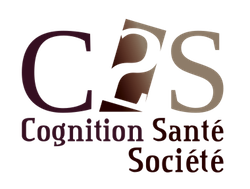French adaptation of the Attentional Control Scale: Confirmatory factor analyses and relationship with trait anxiety and efficiency of orienting, alerting, and executive control attentional networks
Résumé
Background. – The Attentional Control Scale (ACS) is a self-report questionnaire that measures individual differences in attentional control.Objective. – This study compared four models of the French version of the ACS and examined its links to trait anxiety and three attentional networks (orienting, alerting, and executive control) measured with the Attention Network Test (ANT).Results. – Confirmatory analyses conducted with a sample of 284 university students supported a two- factor (focusing and shifting) model. For 59 participants who completed the ANT, we found a positive correlation between focusing and the executive control network, while shifting was negatively correlated with alerting and orienting. Trait anxiety was negatively correlated with focusing and the alerting and executive control networks.Conclusion. – Results are discussed with a view to improving the assessment of attentional control, a key executive dimension for emotion regulation and attentional disengagement in anxiety.
Contexte. – L’échelle de contrôle attentionnel (ACS; Attentional Control Scale) est un questionnaire auto- rapporté qui mesure les différences individuelles dans le contrôle attentionnel.Objectif. – La présente étude compare quatre différents modèles de la version franc ̧ aise de l’ACS et évalue ses liens avec l’anxiété-trait et les réseaux attentionnels d’alerte, d’orientation et de contrôle exécutif mesurés par l’Attention Network Test (ANT).Résultats. – Les analyses confirmatoires ont été réalisées auprès d’un échantillon de 284 étudiants de l’université et ont permis de sélectionner un modèle à deux facteurs (focalisation attentionnelle et déplacement attentionnel). Pour 59 individus de l’échantillon ayant complété l’ANT, nous avons mis en évidence une relation positive entre la focalisation attentionnelle et le contrôle exécutif, tandis que le déplacement attentionnel était associé négativement à l’alerte et l’orientation. Concernant l’anxiété- trait, cette dernière est associée négativement à la sous-échelle focalisation attentionnelle et aux réseaux attentionnels d’alerte et de contrôle exécutif.Conclusion. – Les résultats sont discutés dans une perspective d’amélioration de l’évaluation du contrôle attentionnel, dimension exécutive clé pour son rôle dans la régulation émotionnelle et les capacités de désengagement attentionnel observées dans l’anxiété.
| Origine | Fichiers produits par l'(les) auteur(s) |
|---|




